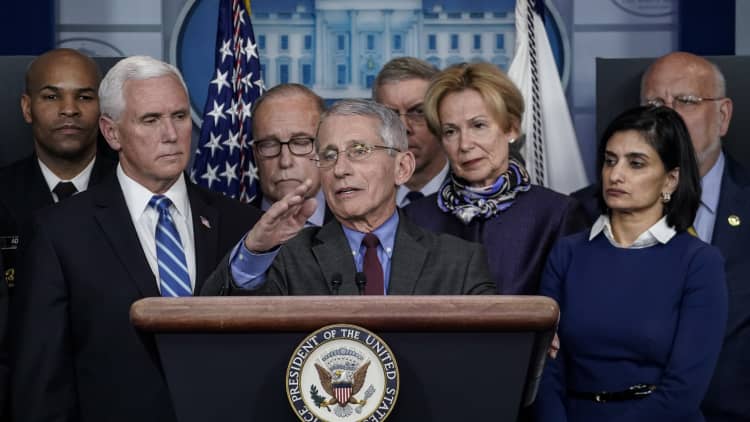White House health advisor Anthony Fauci said the biggest misconceptions about the COVID-19 pandemic are the extremes — on the one hand there are people who think "the world is going to end" and on the other, people "who don't even believe it [is real]."
Neither is true, said Fauci, who is director of the National Institute of Allergy and Infectious Diseases and an immunologist. "It's somewhere in the middle," he said.
Fauci, 79, talked to NBA star Steph Curry, 32, via Instagram Live on Thursday in an effort to help Curry's young fans understand why social distancing is so crucial to "flatten the curve" or slow the rate of new coronavirus infections. Some young people have been slow to take social distancing seriously.
Fauci said people need to know the facts so the country can be in a better place to fight this virus.
"I'd like to get the people in the country to realize that we are dealing with a serious problem. It's something that we've modified our lives [for]," Fauci told Curry. And even if you don't have symptoms, you can still carry the virus and pass it on to love ones, which is important for young people to know, he said.
But also, people shouldn't be unnecessarily scared, according to Fauci.
"We're going through a period of time now where we've got to, as a country, pull together. Don't get frightened. Don't get intimidated. Use [that] energy to be able to confront it and do the kinds of things that will put an end to it," Fauci said.
More than 50,000 of Curry's 29.8 million Instagram followers watched the interview with Fauci, including former President Barack Obama. (During the live chat, Obama commented, "Listen to the science. Do your part and take care of each other.")
Fauci said while it is true that COVID-19 can be a very serious illness for older adults and people with underlying health conditions, young people are not immune.
(For example, in New York City, which has nearly a third of all the confirmed coronavirus cases in the U.S., almost half are in people under the age of 45. The age group accounted for 3% of the city's COVID-19 fatalities.)
On Tuesday, President Donald Trump told Fox News that he would like the American economy to reopen by Easter on April 12, even if COVID-19 cases continues to surge.
However Fauci told Curry that the U.S. needs to see "the trajectory of the curve start to come down" before he thinks things can go back to normal.
As of Thursday, there now more than 75,000 confirmed COVID-19 cases in the U.S., resulting in more than 1,000 deaths, according to data complied by Johns Hopkins University.
Check out: The best credit cards of 2020 could earn you over $1,000 in 5 years
Don't miss:
Coronavirus stockpiling: Don't waste your money on these items, according to a pandemic planner



